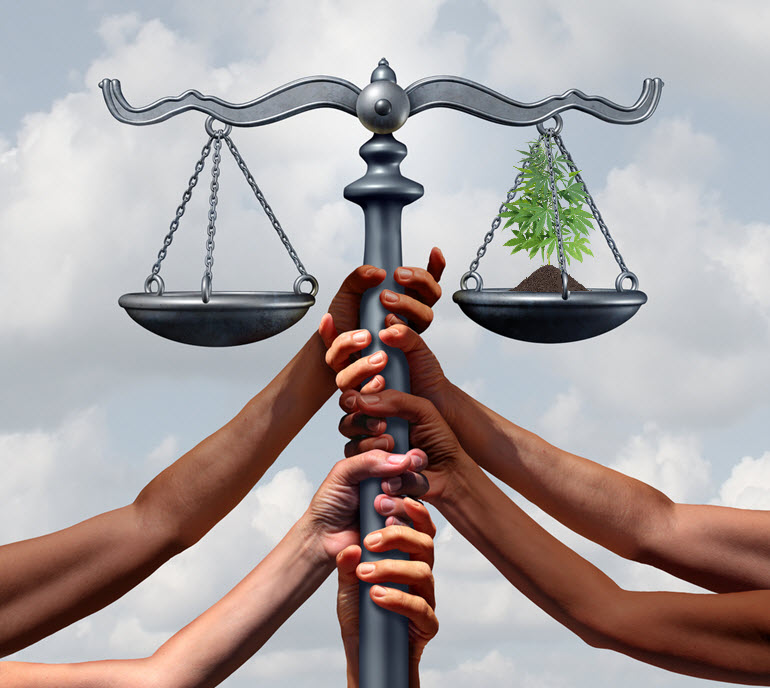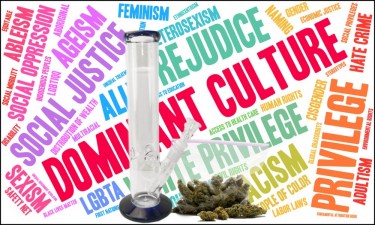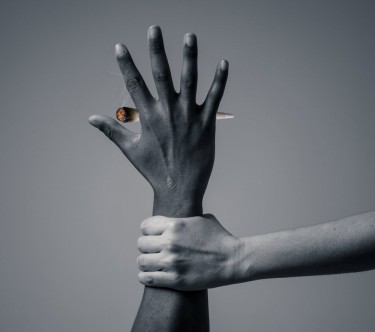
Is mixing social justice with marijuana reform doing more harm than good right now?
Don’t mix social justice with marijuana reform!
Teamster politics is killing the world. The world has been crying out for cannabis legalization for decades, and we’re seeing it happen incredibly slowly. There is no real reason for the delay. Banks agree. People agree. Even the politicians say yes!
Yet for some reason no one can reconcile how to do it. Republicans want to make it most profitable for their Wall Street “Bromies” and milk the marijuana industry as best they can — while Democrats want to use it as a Trojan horse to further their social justice efforts.
As a result, nobody interferes in the politics of the two parties. And that’s exactly the problem!
While true, many communities have been harmed by the war on drugs. Trying to fix it retrospectively by legalizing cannabis won’t undo the damage. Additionally, it’s important to remember that the war on drugs (which, by the way, is still ongoing) is shared by both Republicans and Democrats.
Attempting to use cannabis as a means to “give back to the marginalized” while maintaining the very mechanism that has ravaged their communities is hypocritical at best and downright psychotic at worst.
Schumer has prided himself on being an advocate for legalizing cannabis for years. But has done very little to actually achieve anything. He makes it look like “Schumer vs. the Establishment,” but the truth is that he complicates the legalization process by throwing in unrelated cannabis issues.
Senate Majority Leader Charles Schumer (DN.Y.) told The Hill that Democrats are working to include social justice measures in the bill, which has support from members of both parties.
“We’re trying to add some social justice provisions and see if we can find a compromise,” Schumer said. – The hill
Now, I’m not saying there shouldn’t be changes in ex-offenders. Of course, individuals arrested for cannabis offenses and individuals currently in prison should have their records cleaned and prisoners released.
However, if you enter “which marginalized community should get what percentage of licensing”, etc.
What this creates is debate over “What’s the fair amount you’re paying someone for having ruined their community with your policies for decades?” but also why limit people who have a natural tendency to expand the market .
The fact that you’re marginalized doesn’t automatically qualify you for administrative duties—yet more often than not when it comes to positive action, you don’t do as much as promised. Often only to be hijacked by corporations posing as social justice partners.
“The conversation between Leader Schumer and Congressman Joyce was part of an ongoing, broader discussion between both parties and chambers to determine what reform can happen this Congress,” Joyce’s office said in a statement. “It is a testament to the sincere efforts of both the Chairman and Congressman to find common ground for substantive, bipartisan progress on this issue.” – The Hill
While a handful of Democrats are pushing for broader welfare reforms, Republicans are pushing for a more pro-business model.
The thing is, we shouldn’t have to mix these themes. While it is true that the war on drugs has had a negative impact on marginalized communities… adding these social justice revisions to the cannabis legalization bills will not solve their problems.
Rather, separating the act of legalization from social reform will most likely have the greatest impact on all aspects.
Republicans (and I hate to say this) are right about trying to keep legalization simple. However, it is imperative that any type of legalization program include some level of “personal grow protection.” What’s the point of legalizing weed if you can’t legally grow it in your home?
Of course, this will most likely come down to state legislation, but it would be nice if individual protections related to ownership, cultivation, etc. were addressed.
However, the biggest push for reform is coming from the banking sector. And that’s something both parties should technically agree on.
The lack of banking has created a problem considering cannabis companies are forced to deal with cash only – they become prime targets for robberies. This makes the communities around them less safe and the solution to the problem is quite simple…let banks have protection from prosecution when dealing with legally sanctioned cannabis money.
The way government works, of course, is to connect policy to policy…which means they would have to change other protocols in law enforcement to do so. So what?
Keep it green, then reform the rest…
If you’re hoping to bring social justice to the table, perhaps it would be right to first stop what’s hurting marginalized communities before discussing what compensation you’ll give people.
The problem is not the lack of social justice in cannabis reform, but the fact that policies affecting minority communities are still in effect. In fact, legalizing cannabis will do “something” but very little to right social wrongs.
All it will do is create a black market for other drugs, which will then be met with violence by law enforcement, and again – the place where it all goes down is the same marginalized communities.
When cannabis is no longer a source of income for cartels and gangs, they easily turn to other drugs, such as heroin or methamphetamines, which are typically easier to transport, store and sell at a higher price than cannabis.
We can already see this south of the border in Mexico. The cartels trade their cannabis fields for poppy fields because once cannabis is no longer a lucrative export, they have had to adapt to the times.
If the Democrats don’t get to the root of the problem, all their social justice reforms will be empty promises. It’s a good policy that will do very little to eradicate the mechanism that persecutes blacks and browns at a higher rate than their white counterparts.
Cannabis should be legalized in the interests of cannabis trade and medical access. Social justice issues should not be lumped together with cannabis reform, but should stand as a ‘thing in itself’.
It is time we reviewed our drug policies, it has been more than 50 years since the war on drugs was declared and I believe we have more than enough data to show how ineffective these policies really are. If you’re looking for social justice, if you’re looking for a better future – then the only logical step forward is to end the war on drugs.
Otherwise, it would be the same as advocating for the rights of rape victims while watching the rape and doing nothing about it. If you want to solve social justice problems, it is good advice to focus on “justice” elements.
Cannabis is about health and commerce. While people associated with the plant have been adversely affected by different social policies, the two causes are not intricately linked. If you legalized cannabis and ended the drug war, you would do more for social justice than you ever knew. They would instantly transform the people living in these “hot communities” from police targets into ordinary citizens.
Drugs shouldn’t be illegal…because if you can drink yourself into a coma, you should be able to shoot yourself into a coma, snort yourself into a coma, snort yourself into a coma. Addiction should be treated from a health-oriented perspective as opposed to a law-oriented perspective…and drugs should be taxed and sold in licensed establishments that cater to consenting adults.
By doing so, you are bringing justice to those wrongfully imprisoned for cannabis… but it begins by unraveling the two conflated issues.
SOCIAL JUSTICE AND WEED, READ MORE…

HOW CANNABIS USERS CAN BRING A CHANGE IN SOCIAL JUSTICE!
OR..

IS THE CANNABIS INDUSTRY RACIST? WHAT THE PROS SAY!

Post a comment: